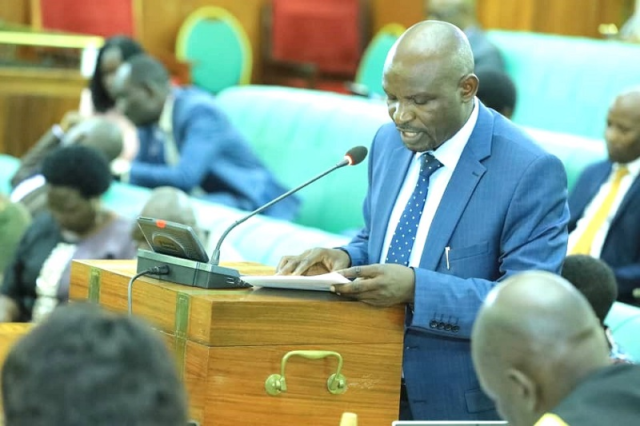
The Uganda National Roads Authority will have to renegotiate a contract with Chongqing International Construction Corporation (CICO) for the reconstruction of Masaka-Mutukula Road and rehabilitation of several roads in Masaka District, Parliament has guided.
The legislators want the China Export & Credit Insurance Corporation (Sinosure) insurance component worth Shs 38.86 billion embedded in an addendum to the proposal to pre-finance the works be reduced by 40 per cent.
The recommendation was contained in a report on the viability of the insurance presented by the Chairperson of the Committee on National Economy, Hon. John Bosco Ikojo, during the plenary sitting on Thursday, 08 August 2024.
According to CICO, the Sinosure Insurance fee is a requirement for all equity and debt investments made by Chinese enterprises in projects outside China, with the aim that in an event where government faces payment difficulties, the insurance will avail funds to the contractor to continue works without interruption.
A loan worth Shs 691.68 billion to finance the construction of the roads was initially approved by the House in December 2023. However, the insurance component was not catered for.
According to the State Minister for Finance (General Duties), Hon. Henry Musasizi, the insurance cost was valued at Shs64.77 billion, which was 100 per cent of the project cost.
Ikojo, also the Member of Parliament for Bukedea County, added that a meeting between the committee and the finance minister concluded with an assurance that government will prioritise payments to the contractor after the two-year grace period.
“This implies that 40 per cent of the project cost will be financed in time to avoid delays in implementation, since debt service is given priority in the available resource envelope. This means the insurance will only be on the 60 per cent which the contractor will borrow,” he said.
A minority report on the addendum, presented by Hon. Hassan Kirumira (NUP, Katikamu County South), had proposed that the House stands over the request until the minister explained the terms and effect of the sinosure insurance to the House, to remove any ambiguity.
Hon. Goreth Namugga (NUP, Mawogola County South), tasked the minister to present a strategy to ensure reduction in borrowing of loans that have not been effectively utilised.
“Honourable colleagues, we are paying commitment fees of close to Shs 434 billion on top of this money that we borrow. We have so far paid Shs 5.5 billion in penalties on cancellation of loans that you have borrowed. The minister should convince us on whether they are ready to provide counterpart funding for these roads,” Namugga said.
The House also approved a recommendation by the committee to revisit the terms for a proposal by government to borrow up to US$136.95 million from Citibank to finance the design and build of package 4: Lusalira-Kasambya-Nkonge-Lumegere-Ssembabule Road Upgrading Project (97km).
“The committee observed that the loan is non confessional, its interest rate is high and the unit cost per kilometre is also high. The committee, therefore, recommends that the Ministry of Finance renegotiates this loan request for better terms,” said Hon. Robert Migadde, the deputy chairperson of the committee.
Another minority report on the loan request, also presented by Hon. Kirumira, questioned whether it was approved by the President before its presentation to the committee on 02 August 2024, noting that that President approved the request in August 2022.
“The National Planning Authority raised many concerns about the President’s letter as it is not clear. We wonder if it would be prudent to allow Parliament to scrutinise the responses of UNRA and the Ministry, on NPA’s concerns,” Kirumira said.
The Deputy Speaker, Thomas Tayebwa, however, explained that the loan proposal would be a good deal for Uganda because the project aims at constructing an oil-road.
“The loan under package four is cheaper than all the loans we approved for oil roads. Oil roads are not like these other roads because they carry heavy equipment. They do double layers on them and where we are doing design for 10 years, here they do design for around 20 years,” said Tayebwa.
“If you say you do not want the road to be done now yet you have finished the other oil roads and you are finalising EACOP [East African Crude Oil Pipeline Project], what is going to happen to the oil storage facilities we are going to put in this site?” he added.






